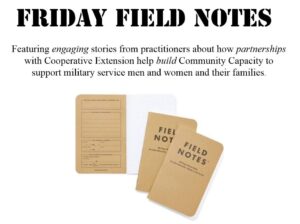
We have made it to the end of our series on disaster preparedness! To wrap up this series, this week’s Friday Field Notes will feature OneOp Network Literacy (MFL NetLit). The OneOp NetLit team helps individuals become more resilient and adaptive within complex social systems through relationship building, personal growth, and shared work.

As we have seen throughout this series, anyone can face disasters and military families have unique situations that they must prepare for. While OneOp NetLit may not have resources directly related to disaster preparedness, the team’s focus is on creating spaces that allow for practice, reflection, connection, inquiry, co-learning and collaboration. Disaster preparedness requires collaboration across many different professions. As military service providers we are all a part of this larger network. Building and strengthening such networks ultimately benefits military families in the end. The Family Readiness System (the DoD Umbrella) plays a key role in providing the services you need for everyday life. Your local access points, Military Family Support Center, National Guard, Army Reserve Family Program, and Military OneSource, can also connect you to other approved providers offering services in your local community.
OneOp NetLit’s values – democracy, social capital, and equity – guide their work and are critical for addressing social issues in a very complex world. You can read more about the team’s guiding principles here. We hope that their approach to networking can be a model and inspiration for service providers looking to branch out and network with others in their practice. Most recently, the team’s focus has been on resilience. So, be sure to read their blog posts, such as Understanding Resilience as a Dynamic Process and Exploring Resilience, to better understand the complex trait and apply their teachings to disaster preparedness.
As this is the last stop in our tour of the OneOp concentration areas, we believe that OneOp Network Literacy provides a positive and hopeful outlook for service providers working with military families. With all of the tools and resources offered by other concentration areas in previous Friday Field Notes, we hope that OneOp Network Literacy provides a way of finding meaningful connections to address the topic of disaster preparedness. Next week, we will take a final look at this resource-packed blog series and highlight critical takeaway points about disaster preparedness.












